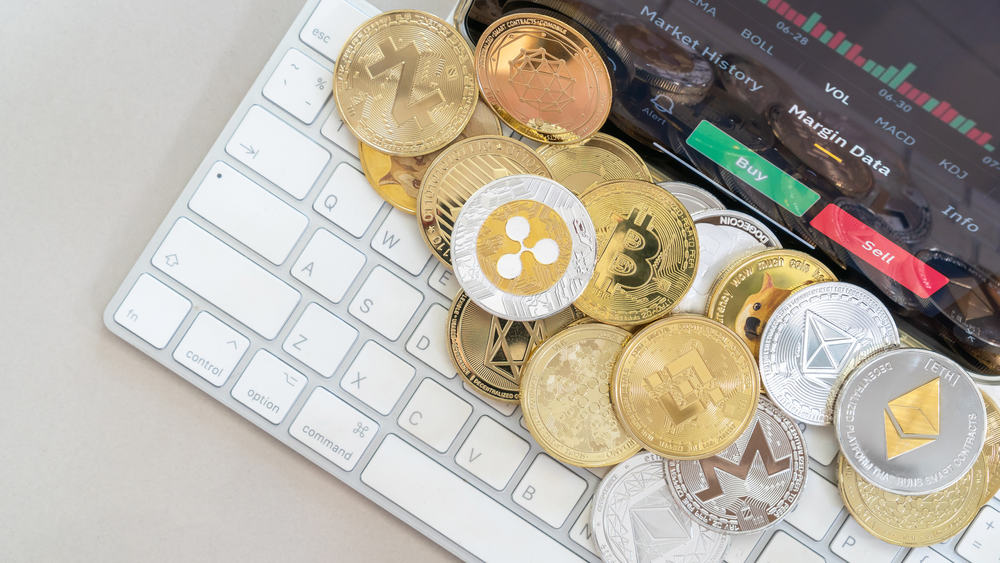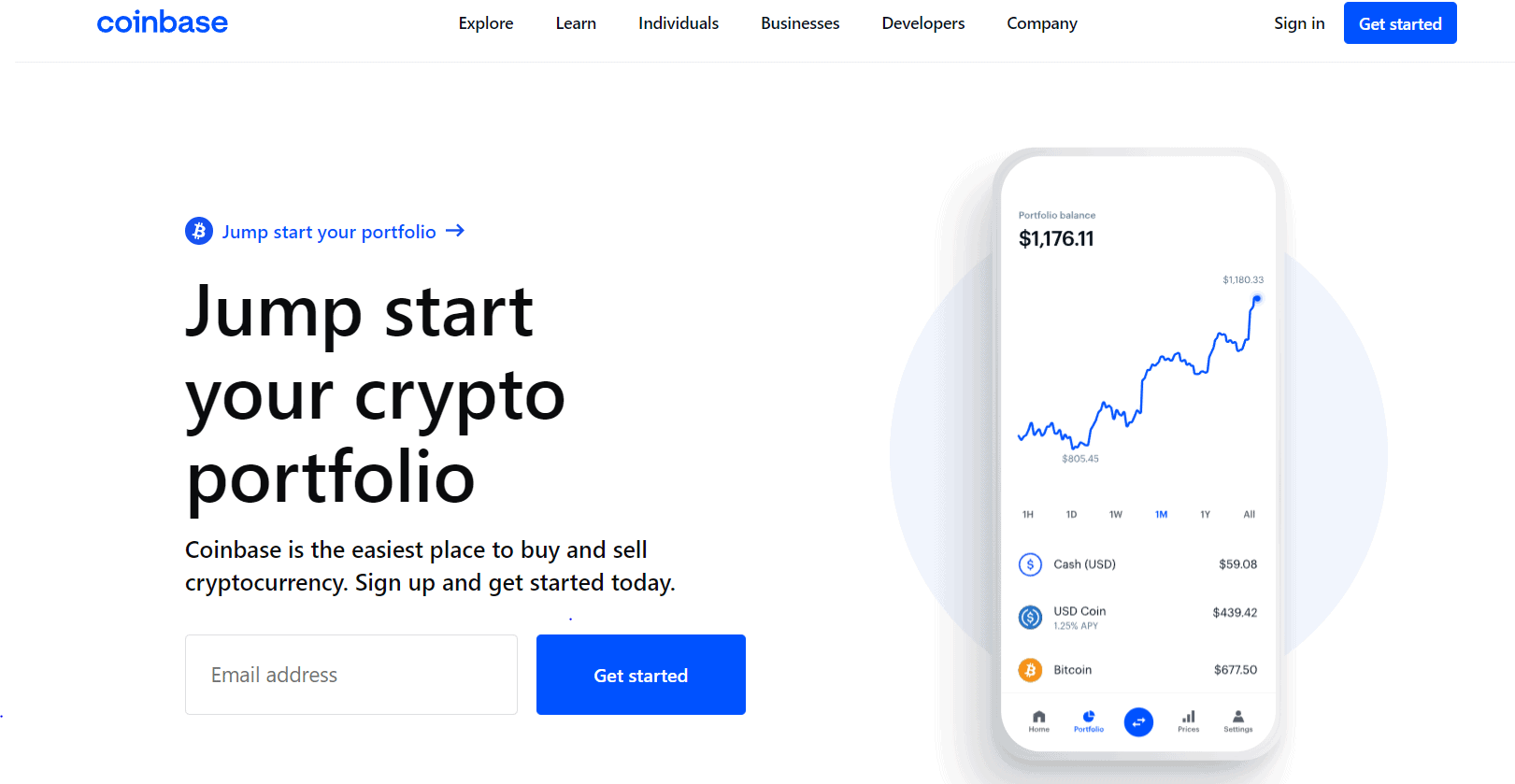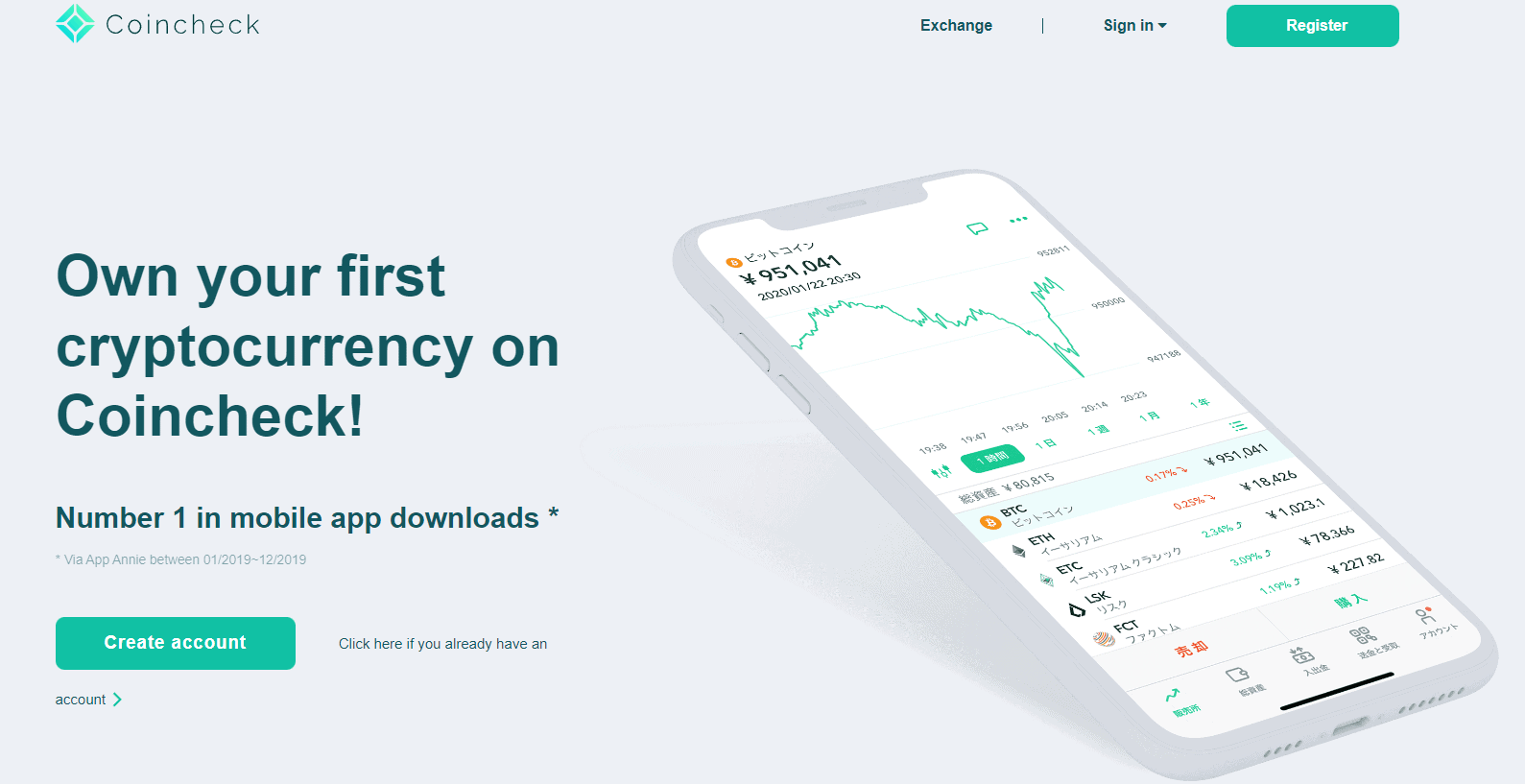
It can be pretty difficult to choose the right crypto exchange for your needs since there are hundreds of active platforms. That’s why we’ll introduce you to Coinbase and Coincheck, two top-quality crypto exchanges.
This Coinbase vs Coincheck comparison will teach you all the essentials about both platforms and help you decide whether you should create a user account on one of them.
About the Exchanges
Coinbase

When it comes to crypto newcomers, Coinbase is among the first trading platforms they encounter because it’s among the top five exchanges and provides services in numerous parts of the world.
The platform started out as a US Bitcoin (BTC) exchange back in 2012 and gradually evolved into one of the most reliable and user-friendly exchanges on the crypto market.
Over the years, Coinbase started including numerous reputable cryptocurrencies оn its list of supported assets, along with a separate NFT market and various additional features, such as crypto staking and crypto collateralized loans. Today, Coinbase is a feature-rich crypto exchange that provides users with all the services they need to invest in crypto and grow their portfolios.
Coincheck

Coincheck is one of the leading Japanese crypto trading platforms. Besides Japan, the platform is also available in various additional global regions, but the focus of the exchange is on the Asian market.
The platform’s simple design allows users to utilize both instant and pro trading interfaces. Coincheck started operating in 2014, and it’s one of the rare crypto trading platforms that survived the rigorous Japanese crypto regulations, which led to the closure of various exchanges in 2018.
In fact, Coincheck was the platform that triggered strong regulatory pressure against crypto exchanges in Japan after the platform suffered a major 500 million USD hack in January 2018. However, Coincheck handled the hack professionally and reimbursed its users, which allowed it to maintain its leading position in Japan despite the hacking incident.
Pros and Cons
Coinbase Pros
- Great selection of more than 170 altcoins
- Both the browser version and the mobile app are easy-to-navigate
- Coinbase Wallet is one of the most popular digital wallets in the world
- Strong selection of NFTs in the Coinbase NFT section
- Deep liquidity for all available coins and tokens
Coinbase Cons
- Few staking options
- High instant trading fees
- Coinbase had a hacking incident when around 6,000 users had their crypto stolen
Coincheck Pros
- Smooth user experience with all key features available in a single interface window.
- Users can pay utility bills through the Coincheck app.
- Great for beginners who want to quickly buy or sell crypto.
Coincheck Cons
- The Coincheck 2018 hack is one of the largest crypto exchange hacks ever.
- A very limited selection of assets.
- The only fiat currency supported by the platform is JPY.
Coinbase vs Coincheck: The Crypto Exchange Comparison
Opening an Account
Coinbase follows US and EU financial regulations that require the platform to use a Know Your Customer (KYC) protocol to prevent money laundering. That’s why the account creation process requires users to prove their identity.
Here’s a step-by-step guide:
- The first step is to create an account by clicking on Get Started.
- Just enter the required details, including your email address and name, and create a password for your account.
- Make sure to confirm you’ve read the user agreement and privacy terms and that you’re at least 18 years old.
- Now you just need to activate your account by entering the code sent to your email address.
- Once you’ve logged into your Coinbase account, it’s time to verify your phone number by tapping the Phone Numbers button in the Accounts section.
- Provide your phone number and enter the code from the text message sent to you by the platform’s verification system.
- You can move on to the identity verification process by selecting the Document Verification option.
- You can choose between your ID card, passport, or driver’s license.
- Upload a photo of your chosen document according to the instructions.
- Once finished, submit your verification request, and wait for Coinbase to notify you via email that your identity has been verified.
Coincheck is another crypto exchange that adheres to strict rules when it comes to user accounts, and you’ll have to provide extensive information to the platform while registering an account:
- The process starts by choosing the Register option on the platform’s website.
- The next step only requires you to create a password and enter your email address.
- Also, confirm that you’re a human and solve the simple captcha.
- Coincheck will send you an email confirmation code for verifying your email address and logging into your account for the first time.
- The platform will immediately start the ID verification procedure and require you to enter various details, such as your full name, address, employment details, date of birth, and other information.
- Once done, you’ll have to provide your phone number and verify it with an SMS code.
- Next up is a photo of your ID document. For ID cards, you’ll need to take a photo of both sides of the card and submit it to Coincheck.
- After the ID document, you’ll also need to take a frontal image of yourself.
- Finally, the platform will ask you to take a short “bubble” video of yourself by fitting your face inside the bubble on the display and moving your head around in a circular motion.
- After finishing this last step, you’re done. Now just wait for the confirmation email from Coincheck. ID verification can take anywhere between a few minutes to a couple of hours.
Main Features
The Coinbase platform offers essential crypto trading options along with a multitude of additional popular crypto services. For example, first-time crypto investors can deposit fiat currency into their platform accounts and directly spend cash on digital currencies with just a few clicks.
However, users who are more used to a detailed trading view with price charts and multiple order types can take advantage of the Advanced Trade interface, which is basically a pro version of Coinbase.
The Coinbase staking service allows users to deposit various cryptocurrencies and earn staking rewards. Additionally, the Coinbase Wallet app is one of the most popular non-custodial wallets on the market. Also, users can connect the Coinbase Wallet to their platform accounts and trade without storing assets on Coinbase.
Furthermore, users can trade NFTs on the rapidly growing Coinbase NFT market section and store those NFTs in their Coinbase Wallet. Finally, the platform has a crypto debit card in partnership with Visa.
Coincheck is synonymous with simplicity, and all of the platform’s features are accessible from a single screen. When you log into your Coincheck account, you can choose a specific crypto asset and instantly initiate a trade through the Buy/Sell options at the current market price.
If you want to broker a better price, you can set your own rate on the Coincheck spot trading interface, where you can monitor the selected asset’s order book and price history.
Coincheck has an over-the-counter (OTC) brokerage service for large-scale transactions, as well as an NFT marketplace in beta testing.
Also, users can pay their electricity and gas bills with their Coincheck crypto balance. Furthermore, the exchange has a feature called periodic purchases that allows users to select specific cryptocurrencies and set up recurring purchases that are automatically executed weekly or monthly.
Supported Cryptocurrencies
Coinbase has evolved from a strictly Bitcoin exchange to one of the most regulated crypto exchanges that still offer a large selection of altcoins. In total, traders can invest in around 170 digital currencies.
The number of cryptos is far lower when compared to some popular unregulated platforms that support hundreds of coins. However, each asset available on Coinbase has guaranteed high liquidity, and the platform has an operating license for it. This means that you can rest assured that all digital currencies on Coinbase are legitimate, reputable projects and not some scammy coins.
You’re able to invest in all of the top crypto projects such as BTC, Tether (USDT), USD Coin (USDC), Avalanche (AVAX), Filecoin (FIL), Aptos (APT), Stellar Lumens (XLM), Ethereum (ETH), Hedera (HBAR), Near Protocol (NEAR), Cardano (ADA), The Sandbox (SAND), Zcash (ZEC), Curve DAO (CRV), Optimism (OP), Chiliz (CHZ), and over 150 other altcoins.
You can also stake the following cryptos and earn an annual percentage yield: ADA, Algorand (ALGO), Tezos (XTZ), USDC, USDT, ETH, Dai (DAI), Cosmos (ATOM), and Solana (SOL).
The crypto selection on Coincheck is much more limited since the platform only supports 20 coins and tokens. It’s important to understand that Japan has some of the strictest crypto regulations in the world, and it’s tremendously hard to obtain operating licenses for less popular altcoins.
In Japan, users can only access regulated exchanges licensed by the Japanese financial authorities, and every crypto needs to have a license. For most altcoin projects, it’s impossible to fulfill all the requirements, and subsequently, Japanese crypto trading platforms offer very few coins.
The following projects are available on Coincheck: BTC, ETH, Ethereum Classic (ETC), Lisk (LSK), Ripple (XRP), NEM (XEM), Litecoin (LTC), Bitcoin Cash (BCH), MonaCoin (MONA), Stellar Lumens (XLM), Qtum (QTUM), Basic Attention Token (BAT), IOST (IOST), Enjin Coin (ENJ), OMG Network (OMG), PLT (PLT), SAND, Symbol (XYM), Polkadot (DOT), and FINANCIE Token (FNCT).
Payment Methods
Investing fiat currency in crypto is quite straightforward on Coinbase because the platform supports all the most popular payment methods. You can add your personal bank account as a payment method to the platform and facilitate transactions of USD, GBP, and EUR to your Coinbase account. Once deposited, you’re free to spend the money on different cryptos.
Also, you can fund your account with a bank card or instantly buy crypto without making a deposit to your account. Additionally, the platform allows users to purchase assets with Google Pay and Apple Pay.
The payment methods supported by Coincheck include bank account transfers and debit cards. Similarly to Coinbase, you can keep fiat currency in your account for spending on crypto over time. However, the key drawback for international users is that the platform only supports the Japanese Yen. You can’t deposit USD or any other fiat currency.
Trading Fees and Limits
Coinbase has two trading fee policies, depending on whether you’re using the instant buy feature on the basic Coinbase platform or the Advanced Trade section for pro users.
All trades through the instant purchase option cost 1%, which is quite high. However, the Advanced Trade fees are much lower, depending on your monthly trading volume.
For example, market makers with a volume lower than 10,000 USD per month pay 0.4% in fees, while takers pay a 50% higher, 0.6% fee. However, the fees can drop dramatically for users with high trading volumes. For instance, if you trade between 100,000 USD and one million USD within a 30-day period, you’ll only pay a 0.2% taker fee or a 0.1% maker fee.
Also, if you’re paying for crypto with your debit or credit card, you’ll incur an extra 3.99% card fee. Bank account deposits, on the other hand, incur a lower 1.49% fee. The best way to fund your account is with an ACH transaction if you’re a US-based user because these deposits don’t incur fees.
Coinbase users can withdraw up to 50,000 USD of assets from the platform on a daily basis.
The Coincheck fee policy is rather unique because there are no trading fees whatsoever. It doesn’t matter if you’re a market maker or a taker, you won’t incur any trading fees. The platform makes money from the market spreads, which are already calculated into the price of the crypto assets available on the platform.
As for deposits, using a bank account transaction is free of charge, while withdrawing money to your account incurs a fixed fee of 407 JPY. Quick deposits with bank cards incur a 770 JPY fee for deposits below 10,000 JPY, while deposits above 10,000 JPY incur a 1,018 JPY fixed fee.
Coincheck doesn’t list any specific daily withdrawal limits.
How Safe Are Coinbase and Coincheck?
Coinbase suffered an unfortunate hack in 2021 when some 6,000 user accounts were breached, and an unspecified amount of crypto was stolen. The exchange revealed that there was a security loophole in the SMS confirmation mechanism for two-factor authentication (2FA) that enabled cyber attackers to breach user accounts.
Luckily, Coinbase immediately patched up the 2FA exploit and refunded customers from the platform’s funds. There haven’t been any additional hacks since then.
As for Coinbase’s regulatory status, the platform has licenses from both US and EU regulators to provide users with financial services, inducing crypto trading.
The Coincheck platform uses a mix of passwords, website encryption, and 2FA to protect user accounts, just like other popular platforms. However, Coincheck was the victim of one of the largest crypto exchange hacks ever in 2018, when the attacker stole around 534 million USD worth of NEM coins. The hack resulted from the fact that the company kept its assets in a hot wallet connected to the internet, which was a huge mistake.
Fortunately, the exchange took full responsibility for the security exploit and reimbursed all affected users. Shortly afterward, the platform resumed its operations and stepped up its security by introducing cold storage for all platform assets. It seems that the new Coincheck safety measures proved efficient since the platform hasn’t been hacked since 2018.
However, after this hack, Japanese financial authorities started crashing down on crypto exchanges, and various platforms had to close down because they weren’t able to meet the new operating requirements. Not Coincheck, as the platform continues to serve traders as one of the key crypto exchanges in Japan.
Customer Support
Unlike numerous leading crypto exchanges that struggle with low-quality customer support services, Coinbase provides users with fast and reliable support. Coinbase doesn’t have a live chat support option. Instead, the platform allows users to talk directly with a support team member through a dedicated phone line available at all times.
Additionally, users can send an email message to the support team or submit a support form with a link to their social media profiles. Coinbase support members can contact users through their preferred social media platforms and help them solve their issues.
Coincheck’s customer support is of much lower quality. Users can send an email with details about their issue to the support team, and that’s it when it comes to direct contact with customer support. Additionally, users can browse the Coincheck FAQ section if they have a basic issue, such as how to verify their ID or fund their account.
Mobile Trading
Coinbase provides traders a top-quality mobile experience through the Coinbase and Coinbase Wallet apps. Through the Coinbase app, users can use instant trading, staking, and NFT trading services. Also, users can fund their accounts, manage their assets, and even take out crypto loans.
However, users can’t access the Advanced Trade service. Instead, the platform plans to launch a separate Advanced Trade app in the near future. Furthermore, users can connect their Coinbase Wallet app with their Coinbase account and practically use the wallet as their primary trading app, with the additional safety of storing crypto in a non-custodial manner.
The Coincheck exchange has an easy-to-use and very practical mobile app. The platform’s mobile version gives users access to both instant and pro trading through the Coincheck advanced interface. Users can easily shift between the two trading interfaces, deposit cash, sell crypto, and manage their portfolios.
How Do Coinbase and Coincheck Compare to Other Crypto Exchanges
Coinbase and Coincheck focus on providing users with simple, quick access to crypto, mostly through instant trading. That’s why we’ll compare these platforms with Kraken and Gemini because these exchanges have a similar focus.
Both Kraken and Gemini come with a straightforward design meant to enable users to easily make crypto investments. The instant buy/sell feature on Gemini gives users access to nearly 100 coins, while Kraken supports more than 200 altcoins. Both platforms have a much larger selection of coins than Coincheck, while compared with Coinbase, only Kraken has a broader range of cryptos.
Just like Coinbase and Coincheck, their competitors are registered as money service providers with operating licenses from reputable regulatory bodies.
Concerning fees, Kraken and Gemini charge 1.5% for instant trading, which is even higher than Coinbase’s already high 1% fee. These platforms can’t compete with Coincheck’s zero-fee policy. As for pro trading, Kraken and Gemini have similar fees to those on Coinbase.
Conclusion
Both Coinbase and Coincheck are high-quality crypto exchanges with similar services, but Coinbase is much more feature-rich compared to Coincheck. Also, while Coinbase is an international trading platform that operates in most parts of the world, Coincheck is focused on Japan and a few additional Asian regions.
Coinbase is overall a better choice than Coincheck, but if you’re located in Japan, you won’t be able to use it. That’s why Coincheck is the next best choice for Japanese crypto enthusiasts.



